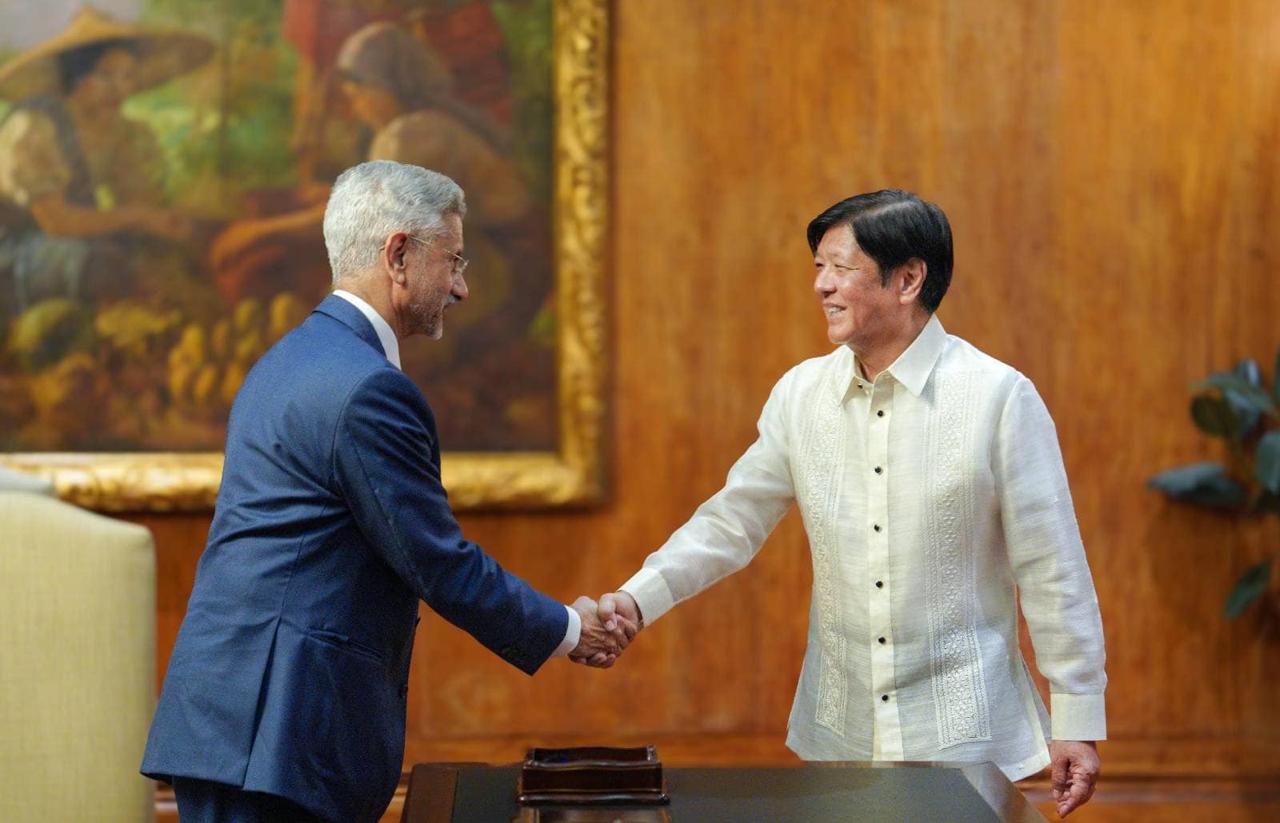
President Ferdinand Marcos meets with Indian Minister of External Affairs Subrahmanyam Jaishankar in the Malacañan Palace on March 26, 2024. Photo from the Presidential Communications Office.
The government of India has reiterated its support for the Philippines in the latter’s assertion of territorial rights in the West Philippine Sea, as well its recognition of the 2016 arbitral ruling that rejected Beijing’s claim over practically the entire South China Sea, a visiting official said on Tuesday.
In his courtesy visit to Malacañang, Indian Minister of External Affairs Subrahmanyam Jaishankar assured President Ferdinand Marcos Jr. that New Delhi was “very resolute” in its position to uphold the United Nations Convention on the Law of the Sea (Unclos), the basis of the Manila’s arbitration case.
“So if you want a country which actually says will accept the judgment even if it goes against us, we are actually a natural candidate. So we can be on your ship,” Jaishankar told the President.
Jaishankar said it was important for the Philippines, India and other countries to coordinate and uphold international law to maintain peace and order in the Indo-Pacific region.
READ: India backs PH in upholding sovereignty in WPS
In response, Marcos acknowledged the support of the Indian government in upholding Philippine sovereignty in the West Philippine Sea, calling it “an important development” for the Filipino people.
Maritime security
He said the Philippines and India shared common interests in maintaining peace and order in the Indo-Pacific region, and that India was one of the like-minded countries upholding international rules-based order.
The two countries need to start thinking about forging partnerships, Marcos said, as the world has become “very closely connected.”
“We have many shared interests—primary of that is to maintain the peace in our areas and so this is a concern now, not only of India or of the Philippines alone but the entire world,” the Philippine leader said.
“So, whatever it is that we can do to make the situation better, in partnership with India, will certainly be an important development for us,” Marcos added.
During the meeting, the governments of the two countries agreed to work together to ensure maritime security for Filipino sailors and Indian shipping companies, given the increasing dangers of seafaring.
Marcos highlighted the important contribution of Filipino seafarers manning the world’s merchant ships, whether tankers, cruise ships, or other vessels.
The President said the Philippines and India needed to forge a partnership as the world’s oceans are becoming more dangerous to commercial shipping. He cited the security concerns faced by shipping industry, like the threats in the Red Sea, the Gulf of Aden and in the Indian Ocean.
“We’re ready to join up if there are opportunities for us to work together. It really is at a crisis point of shipping, and maybe we can find something that we can do together to ease the situation at least a little bit until the conflict becomes less heated,” he added.
Rescue assistance
The President assured Jaishankar that on the domestic front, the Philippine government has been trying to fix some issues confronting Filipino sailors that he hoped would eventually give them an advantage in the global job market.
“We have just rationalized the local system for the support of our local seafarers because before it has been a little bit haphazard, but now I think we made some sense of it and I think we will be going to [have] a great advantage,” he said.
Signing on hold
Last month, the President put on hold the signing into law of the proposed Magna Carta of Seafarers, which seeks to guarantee sailors’ right to humane working conditions and just compensation, over supposedly questioned provisions.
During Jaishankar’s visit, Marcos also took the opportunity to thank the Indian government for its navy’s rescue and assistance extended to 13 Filipino crew members of the MV True Confidence that was attacked by Houthi rebels off the coast of Yemen earlier this month. INQ